Report 2016
3rd DeafIT Conference on 21./22. October 2016 in Hamburg
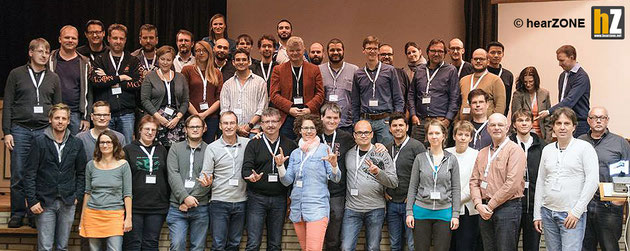
In the year 2016 the DeafIT Conference were moved into the high north to the Hanse town Hamburg after two conferences in the south, which were located in Munich and Nürnberg.
Many participants were coming from all parts of Germany - Hamburg, Berlin, Köln, Nürnberg, Munich, Husum.
We could welcome international guests as well as listeners from Poland and Denmark at the third conference. As in the previous year, the conference was translated barrier-free in terms of sign language, text language and pronunciation.
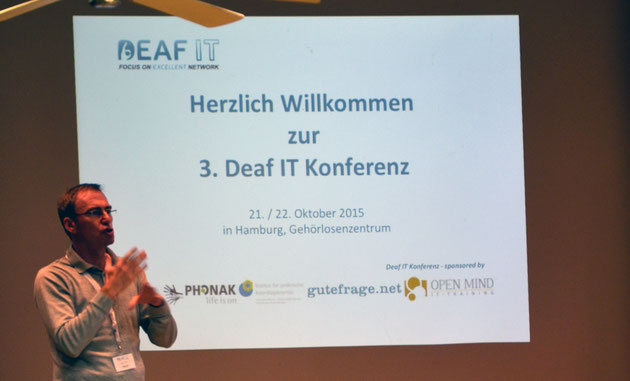
At the beginning Tobias Burz, the founder and pioneer of the DeafIT conference, welcomed the participants and introduced them into the conference. He presented the organization team for this year's conference with Manuel Gnerlich, Fabian Spillner, Nicole Weißkopf and Christian Beilborn, thanking them for their support, and especially the sponsors by their names. Among other things, he was pleased that the number of participants rose to more than 60 visitors compared to the last conferences. This in turn showed us that the interest and the need in the future can be continuously increased and how important this unique conference is for all.
The topics of the DeafIT conference were diverse and were at the highest level so that each participant could take a lot of them with great interest for their own work and got a view over their own edge.
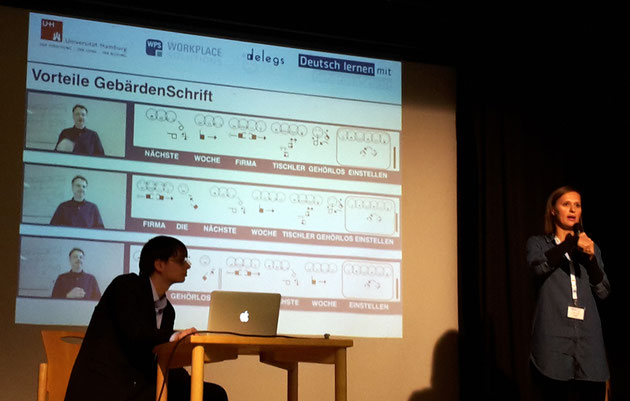
The conference started at Friday afternoon with two presentations "glasses with live subtitling" by Hristo Trajkovski and "sign language with Java" by delegs. Thus, two projects and their technology were presented, which are a great enrichment in today's communication technology for the hearing-impaired.
The participants got an insight into the technique and practice of live subtitling with the glasses. They were able to watch the talk of speeches, presentations live through subtitles directly in the glasses without using a tablet or notebook.
There is no language for the sign language, isn’t it? Delegs proved it and showed us that it is possible to translate sign language in pictorial language through the Java program. This approach allows users to learn, write, and read the sign language.
In the evening there was a cozy get-together in the "Schweinske" restaurant in Hamburg-Altona, where all participants were able to get to know each other and share their experiences about their work.
The following Saturday was filled with many presentations and topics from various areas of the information and technology sector.
The NodeJS programming language is the newer PHP programming language which is used as a platform for software development to run network applications and web page programming. Dariusz Krzeminski (Software developer) showed us the advantages and disadvantages of the programming language NodeJS by means of practical examples. He believes that it will occupy the future of dynamic websites.
As the following speaker Nicole Weißkopf (Senior Community Manager) gave an insight into her professional community management and her practical work. She explained the difference between the both job profiles community management and social media management, which are not the same as most people thought. The community is referred to as a group with the same interests, whether online or offline, while social media stands for digital media and technologies like Facebook, Twitter.
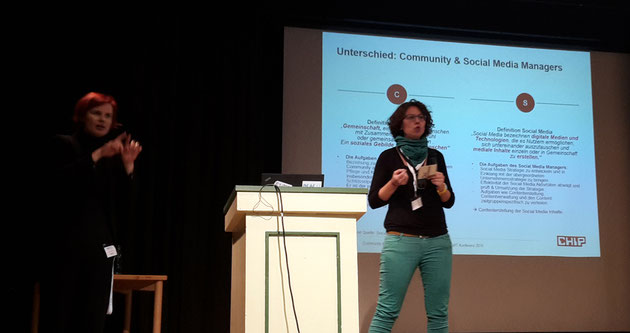
Currently there is a hype for Microservice in the information technology sector. Manuel Gnerlich (freelance software consultant) told us the historical backgrounds and developments of Microservices. Microservices are architecture patterns of information technology and small and largely decoupled services in the complex application software. They communicate with each other in the network. With the help of these Microservices the applications can be developed modular, maintainable and fast.
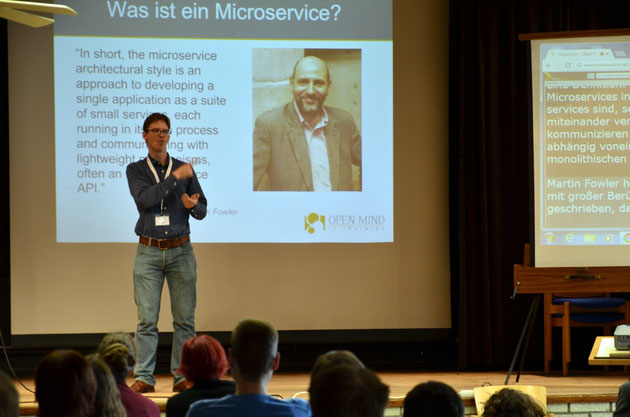
In the two-hour lunch break with Chinese food, the participants were able to exchange their experiences and learn about their selves. Additionally to it, they were able to visit the sponsor exhibition stands such as Phonak, delegs, Tess & Telesign, as well as other stands in the foyer, test some techniques, try out, and obtain information during the conversations or from the brochures.
For the first time, a workshop on "Microservices build" took place in the afternoon. Interested participants got a practice introduction from Fabian Spillner (Senior Software Engineer) how they can implement Microservices in Scala via the Finagle Framework. Subsequently they were able to implement themselves such services in Scala on their own laptops and code these actively.
Parallel to the workshop, two presentations were presented on the topic of design. Uta Meissner (Computer scientist) gave insights into the topic of image processing and clarified the differences between image processing and image editing as well as the importance of image processing in the printing area. In image processing, computer science and electrical engineering are concerned with how the finished images, photographs or individual images from video can be tested for output in the printing area and transmitted via signals. In doing so, she pointed out the important mathematical contexts for the transmission.
Jolanta Paliszewska (Interfacedesign student) showed the contents of her course of studies, also called interface design. In Interface design the aim is to optimize the interaction via a user interface (Usability) between people and machine to the needs of people in order to achieve a positive effect.
After the coffee break, all the participants came together to discuss two further topics and the next podiums discussion.
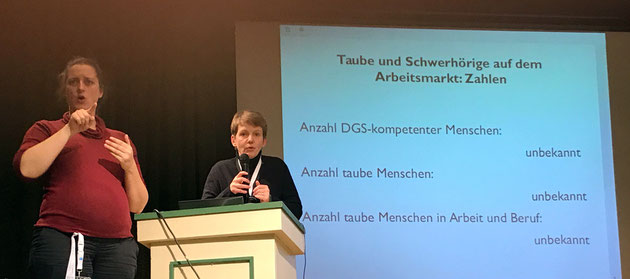
At first we went on with the presentation about Industry 4.0. Martin Ostendorf (Economical information scientist) and his hearing colleague Dr. Phanthian Zuesongdham (Head of Corporate Process Management and smartPORT Program Management) told us how the zone of the second-largest container port in Europe in Hamburg is networked by smartPort. They gave us the insight into this topic with a video and pictures about how the port of Hamburg is able to ship many containers in the world every day using a cloud-based control system, which SmartPort Logistic - a traffic management software - optimally and effectively as well as to transport them to further locations.
Dr. Irmhild Rogalla (Scientist) came up with the keynote "Professional perspectives in IT and the media specifically for the hearing-impaired people". This topic also served as the basis for the first ever podium discussion on "Special challenges for the hearing impaired in the IT and media sector", which was the main focus of the 3rd DeafIT Conference in Hamburg.
Dr. Irmhild Rogalla told us about her research results in her study which jobs the hearing-impaired people are using and the jobs which promise them their future. These jobs are mainly those which are to be found in the IT sector, among them IT specialists, IT merchandiser, as well as design jobs such as media designers in digital and print or for audiovisual media and photographers.
In this discussion, there was clear evidence that, for the most part, an independent initiative, willingness and courage of the hearing-impaired people is necessary to take the new IT jobs into their hand and to unleash from the "typical" old professions. There was a demand that the interpreter commitment must always be made possible for every IT newcomers or, IT experts without bureaucratic and financial obstacles. It has also been noted that the school plan for the hearing-impaired pupils has to be modified in such a way so that the schools can lead the pupils to the new jobs because of the constantly changing professional chances. It was addressed in these schools in the last time often, but until now it was still not properly realized.
With this basic knowledge, the podium discussion, which Tobias Burz (deaf) has led as moderator and brought the participants Dr. Irmhild Rogolla (hard-of-hearing), Dr. Hans-Günther Ritz (hearing), Fabian Spillner (deaf) and Manuel Gnerlich (deaf) into the interesting discussion.
The DeafIT team takes these wishes very seriously and thanks all the participants of the DeafIT conference 2016 in Hamburg for the open word and the feedback. The conference will be improved year by year!
We would like to thank all the sponsors and supporters for the great support of this conference, the sign language interpreters, who have made outstanding translations, the text interpreters and the participants, without them the great conference would not have come to a successful conclusion.
The location and the date of the next 4th DeafIT Conference will be announced very soon! Thank you very much and we will meet again at the next conference!
Your DeafIT team
Text: Tobias Burz, Nicole Weißkopf
Pictures: DeafIT
DeafIT Conference 2016 - Sponsored by


Press information 2016
Media partner DeafIT Conference 2016
hearZONE (now sonos) a newspaper for people with hearing disabilities & interesting people
In the new hearZONE (jetzt sonos) - October issue no. 34 there is an interview with Tobias Burz and Nicole Weißkopf from the DeafIT team about the 3. DeafIT Cconference in Hamburg. Look into this hearZONE October issue no. 34
11. November 2016 - hearZone: 3. DeafIT Konferenz in Hamburg
11. Oktober 2016 - hearZONE: Im Gespräch: Tobias Burz & Nicole Weißkopf
26. September 2016 - hearZONE: 3. DeafIT Konferenz in Hamburg
Further press contents:
kobinet news, 23 August 2016: Konferenz von DeafIT
Taubenschlag, 5. September 2016: Dritte DeafIT-Konferenz
GMU - Gehörlosenverband München und Umland, 18. September 2016: 3. DeafIT in Hamburg
gebärdenwelt.tv: DeafIT Konferenz 2016 in Hamburg
Vibelle: DeafIT-Konferenz 2016
Schlappohren-HD, Self supported group für hard of hearing and deaf people Heidelberg: DeafIT Konferenz im Oktober in Hamburg
Schnecke-Online: DeafIT-Konferenz 2016

